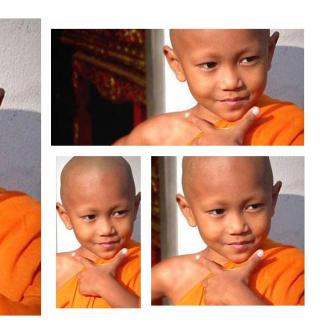Image Generation
1989 papers with code • 85 benchmarks • 67 datasets
Image Generation (synthesis) is the task of generating new images from an existing dataset.
- Unconditional generation refers to generating samples unconditionally from the dataset, i.e. $p(y)$
- Conditional image generation (subtask) refers to generating samples conditionally from the dataset, based on a label, i.e. $p(y|x)$.
In this section, you can find state-of-the-art leaderboards for unconditional generation. For conditional generation, and other types of image generations, refer to the subtasks.
( Image credit: StyleGAN )
Libraries
Use these libraries to find Image Generation models and implementationsDatasets
Subtasks
-
 Image-to-Image Translation
Image-to-Image Translation
-
 Image Inpainting
Image Inpainting
-
 Text-to-Image Generation
Text-to-Image Generation
-
 Conditional Image Generation
Conditional Image Generation
-
 Conditional Image Generation
Conditional Image Generation
-
 Face Generation
Face Generation
-
 3D Generation
3D Generation
-
 Image Harmonization
Image Harmonization
-
 Pose Transfer
Pose Transfer
-
 3D-Aware Image Synthesis
3D-Aware Image Synthesis
-
 Facial Inpainting
Facial Inpainting
-
 Layout-to-Image Generation
Layout-to-Image Generation
-
 ROI-based image generation
ROI-based image generation
-
 Image Generation from Scene Graphs
Image Generation from Scene Graphs
-
 Pose-Guided Image Generation
Pose-Guided Image Generation
-
 User Constrained Thumbnail Generation
User Constrained Thumbnail Generation
-
 Handwritten Word Generation
Handwritten Word Generation
-
 Chinese Landscape Painting Generation
Chinese Landscape Painting Generation
-
 person reposing
person reposing
-
 Infinite Image Generation
Infinite Image Generation
-
 Multi class one-shot image synthesis
Multi class one-shot image synthesis
-
 Single class few-shot image synthesis
Single class few-shot image synthesis
Most implemented papers
Analyzing and Improving the Image Quality of StyleGAN
Overall, our improved model redefines the state of the art in unconditional image modeling, both in terms of existing distribution quality metrics as well as perceived image quality.
Wasserstein GAN
We introduce a new algorithm named WGAN, an alternative to traditional GAN training.
Improved Training of Wasserstein GANs
Generative Adversarial Networks (GANs) are powerful generative models, but suffer from training instability.
Progressive Growing of GANs for Improved Quality, Stability, and Variation
We describe a new training methodology for generative adversarial networks.
A Style-Based Generator Architecture for Generative Adversarial Networks
We propose an alternative generator architecture for generative adversarial networks, borrowing from style transfer literature.
GANs Trained by a Two Time-Scale Update Rule Converge to a Local Nash Equilibrium
Generative Adversarial Networks (GANs) excel at creating realistic images with complex models for which maximum likelihood is infeasible.
Denoising Diffusion Probabilistic Models
We present high quality image synthesis results using diffusion probabilistic models, a class of latent variable models inspired by considerations from nonequilibrium thermodynamics.
Self-Attention Generative Adversarial Networks
In this paper, we propose the Self-Attention Generative Adversarial Network (SAGAN) which allows attention-driven, long-range dependency modeling for image generation tasks.
Improved Techniques for Training GANs
We present a variety of new architectural features and training procedures that we apply to the generative adversarial networks (GANs) framework.
SinGAN: Learning a Generative Model from a Single Natural Image
We introduce SinGAN, an unconditional generative model that can be learned from a single natural image.





















































































 CIFAR-10
CIFAR-10
 ImageNet
ImageNet
 CIFAR-100
CIFAR-100
 MNIST
MNIST
 Cityscapes
Cityscapes
 CelebA
CelebA
 Fashion-MNIST
Fashion-MNIST
 CUB-200-2011
CUB-200-2011
 FFHQ
FFHQ
 Oxford 102 Flower
Oxford 102 Flower
